The Princeton Review (TPR) is a well-known education company offering test preparation, tutoring, and admissions services. For over 40 years, students and families have trusted TPR to help them reach their school and career goals. In 2025, TPR continues as a leading provider of courses for exams ranging from grade school to graduate level. It was founded in 1981 and is now part of a global education group. Students use TPR’s products to boost grades, test scores, and college applications. The company also helps working professionals prepare for licensure exams or advance their careers.
Test Preparation Courses
TPR offers a wide range of test prep courses for students of all levels. These include standardized tests for college admissions (like the SAT, ACT, and AP exams) as well as graduate and professional school tests (GRE, GMAT, LSAT, MCAT). The courses come in several formats: live online classes, in-person classes, and self-paced online programs. Many of TPR’s test prep courses come with the “Better Scores or Your Money Back” guarantee. This means if a student doesn’t see the promised score increase, they may get a refund or free course retake. TPR updates its course material each year to match any changes in the exams. For example, in 2024 the SAT 1400+ course was its most popular class for college-bound students, while the LSAT 165+ and MCAT 515+ courses were top picks for graduate-level test takers.
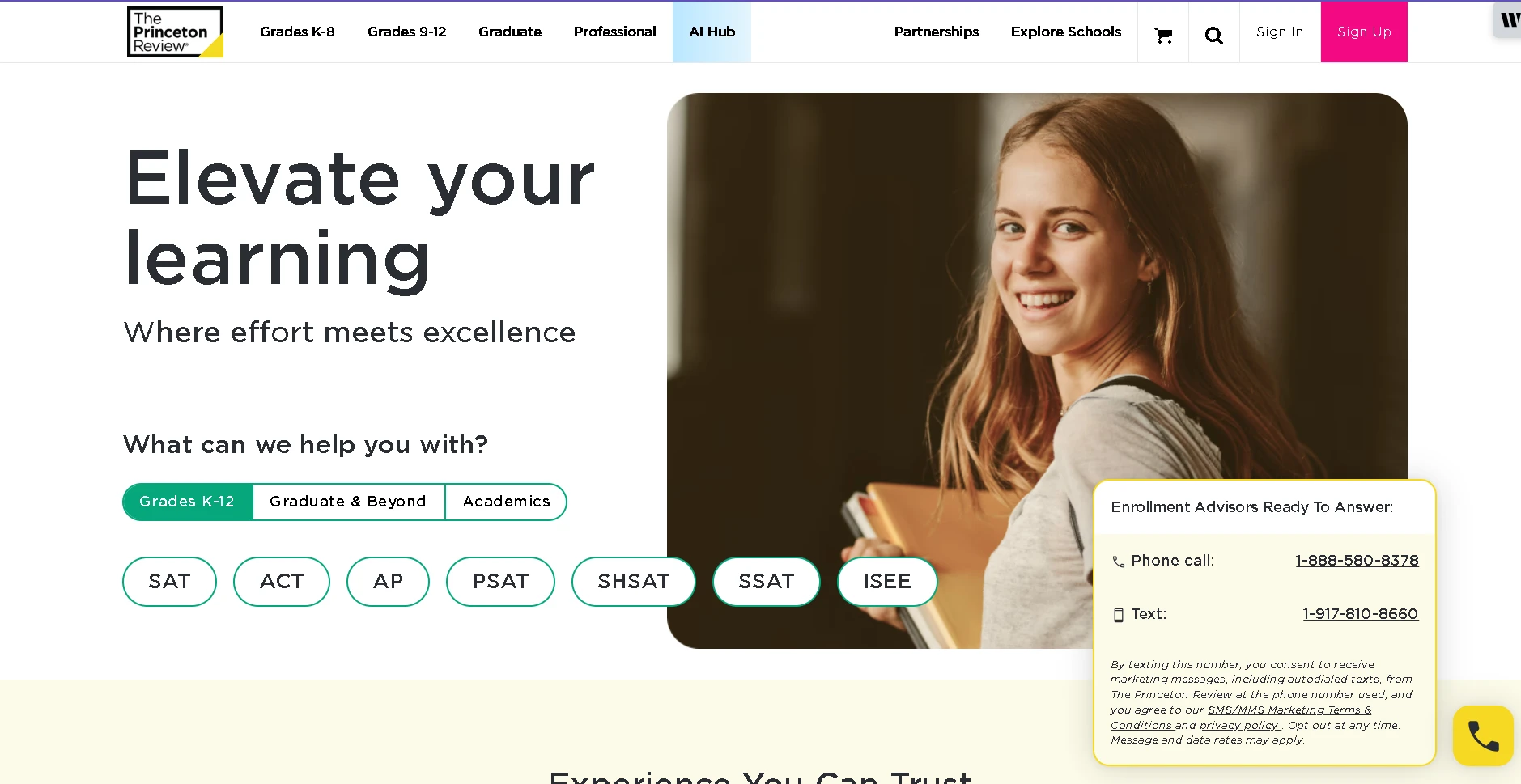
College Admissions Test Prep (SAT, ACT, AP)
For high school students, TPR provides SAT and ACT preparation. Their SAT offerings include a “1400+ Course” aimed at reaching a high score, and even a “1500+” tutoring plan for top percentiles. The ACT side has similar courses for scores above 31. These courses cover all test sections (like math, reading, writing) with strategy lessons, practice drills, and full-length practice tests. TPR often bundles SAT and ACT prep together. For example, the self-paced SAT & ACT course Start costs $299 and includes 365 days of access to lessons, video content, and practice tests. Live online SAT classes are available too, starting around $649 (on sale) for multiple weeks of instruction. They also offer AP exam prep in many subjects, as well as PSAT and other pre-college tests. TPR regularly refreshes its AP prep materials so they match the current exam content.
These high school courses are structured and interactive. Students watch bite-sized video lessons and work through thousands of practice questions with detailed answer explanations. Every full practice test comes with a thorough score report, helping students see their strengths and weaknesses. For example, after each SAT practice exam, students receive a breakdown of their performance on each question type. If a student is not satisfied, TPR lets them repeat the class for free or gives a refund (see “Guarantee” below). Overall, TPR’s college test prep is ideal for students who want clear guidance and a set schedule. Younger or self-motivated learners who prefer studying alone might also consider free resources like Khan Academy, but TPR’s courses add personal instruction and accountability.
Graduate & Professional Test Prep (GRE, GMAT, LSAT, MCAT)
Graduate-level test prep is a key offering at TPR. They have courses for the GRE (for master’s programs), GMAT (for business school), LSAT (for law school), and MCAT (for medical school), among others. Each graduate exam has its own courses and tutoring. The curriculum is in-depth: for example, TPR’s GRE prep requires over 30 hours of video lessons, hundreds of practice problems, and multiple practice exams. TPR boasts an industry-leading guarantee on these: their GRE courses promise a higher score or tuition back. In fact, they allow students to repeat the GRE program for free if they don’t reach their target scores.
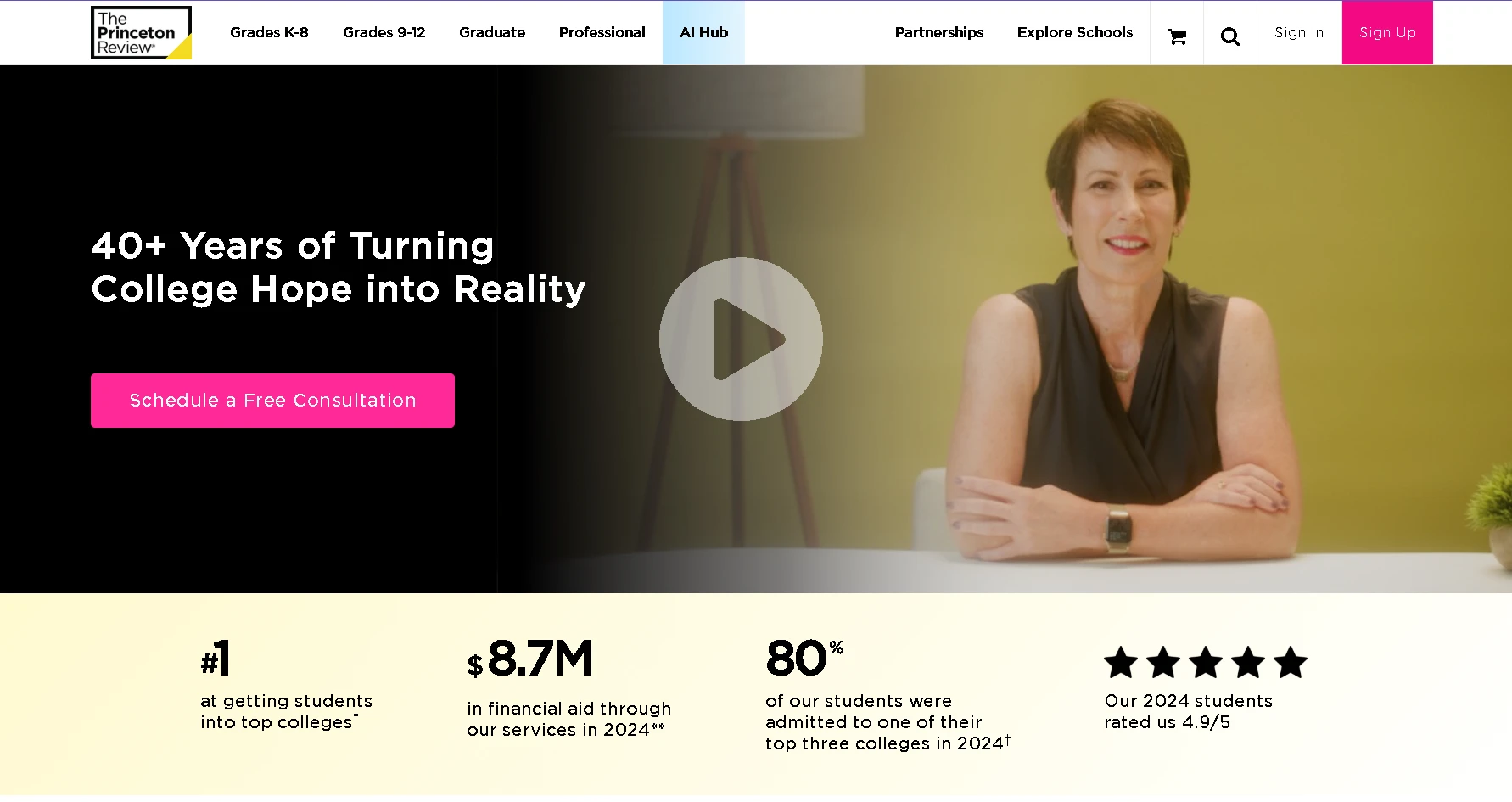
Popular graduate courses include “LSAT 165+” and “MCAT 515+,” which are intensive programs aimed at high-scoring students. These courses cover all exam sections (such as logical reasoning for LSAT, or biology/chemistry for MCAT) with expert instruction. They include extra material like official practice tests and strategy guides. TPR also offers smaller courses like “GRE Basics” or targeted tutoring. In addition, there are courses for professional licensing exams. For example, TPR has a comprehensive USMLE prep package for medical boards, and live online or self-paced courses for the NCLEX-RN nursing exam. It even provides resources for finance certifications like the CFA levels I–III and for CPA, CMA, and CISA (through a partnership). This broad coverage makes TPR a one-stop shop for many students seeking advanced exam help.
However, it’s important to note some recent developments around guarantees. TPR’s MCAT prep used to promise that students would score at least 515 or gain 15 points, or else get a refund. In 2024, a self-regulatory group (the NAD) reviewed these claims and recommended TPR stop making them, citing a lack of evidence that most students could achieve such large gains. TPR agreed to discontinue that specific guarantee. So while TPR still has general score-increase promises (like “higher score or money back” on many courses), they have had to adjust any very bold MCAT promises. This NAD recommendation highlights that guaranteed score increases should be taken cautiously and require real data to back them up.
Professional Licensing and Certification Prep
Besides school exams, TPR offers courses for a range of career exams. In healthcare, they have MCAT as noted, and full courses for medical board exams (USMLE) and nursing (NCLEX). In finance and accounting, they cover the CFA exams and provide discounts for CPA, CMA, and CISA reviews. For other fields, they have test prep for the LSAT (law), GRE (grad school), GMAT (MBA), and even SAT Subject Tests (where offered). Many professional fields also use SAT/ACT for entrance (some tech programs), so TPR’s broad test library serves professionals seeking further education. Essentially, if there is a standardized exam for a school or license, TPR likely has materials for it, often including digital resources (books or apps) along with live instruction.
Tutoring and Academic Services
Tutoring Options: In addition to test prep classes, The Princeton Review offers private tutoring in many subjects. Their home tutoring service connects students to subject-matter experts on demand. As of 2024, TPR reports having over 3,000 tutors available online. These tutors cover more than 80 subjects, from basic math and science to advanced subjects like calculus, physics, chemistry, and computer science. The tutoring is offered 24/7: students can log in any time to get help with homework or studying. Two main portals exist for this: an “Instant Homework Help” section for quick questions and a “LiveOnline Academic Tutoring” hub for scheduled sessions. For example, a student struggling with a physics problem can start an instant chat with a physics tutor, or schedule a one-on-one tutoring session ahead of time.
Online Tutoring Sessions: TPR’s tutoring is delivered through an online classroom. Students connect via video chat to a tutor and work together on a virtual whiteboard. Tutors can see the student’s screen and vice versa. This setup lets the tutor guide the student through problems step by step. The platform supports text chat and file sharing as well, so students can send screenshots of their work. Top subjects that students seek help in include mathematics and physics – indeed, TPR notes that calculus, pre-calculus, and physics were the most requested topics in 2024 princetonreview.com. Tutors can save notes and practice problems in a student portal, so that each session is tailored to the student’s past trouble spots, medlifemastery.com. This personalized approach helps students build confidence and improve their grades.
Instant Homework Help vs Live Tutoring: For quick study questions, TPR’s Instant Homework Help allows students to connect to the next available tutor and get an immediate answer. This is good for single problems or quick review. For more in-depth help, LiveOnline Academic Tutoring is used. In a live tutoring session, the student and tutor might spend an hour working through several problems or concepts. Students can request tutors by subject (e.g. Organic Chemistry) and often receive help within minutes. All tutoring by TPR is one-on-one; there are no group sizes. The cost of tutoring varies by subject and level. For MCAT tutoring, packages range up to $8,800 for 50 hours (though TPR offers money-back guarantees on MCAT tutoring performance as well). Elementary or high school subjects cost less per hour. In general, tutoring is more expensive than a class course, but it provides customized attention.
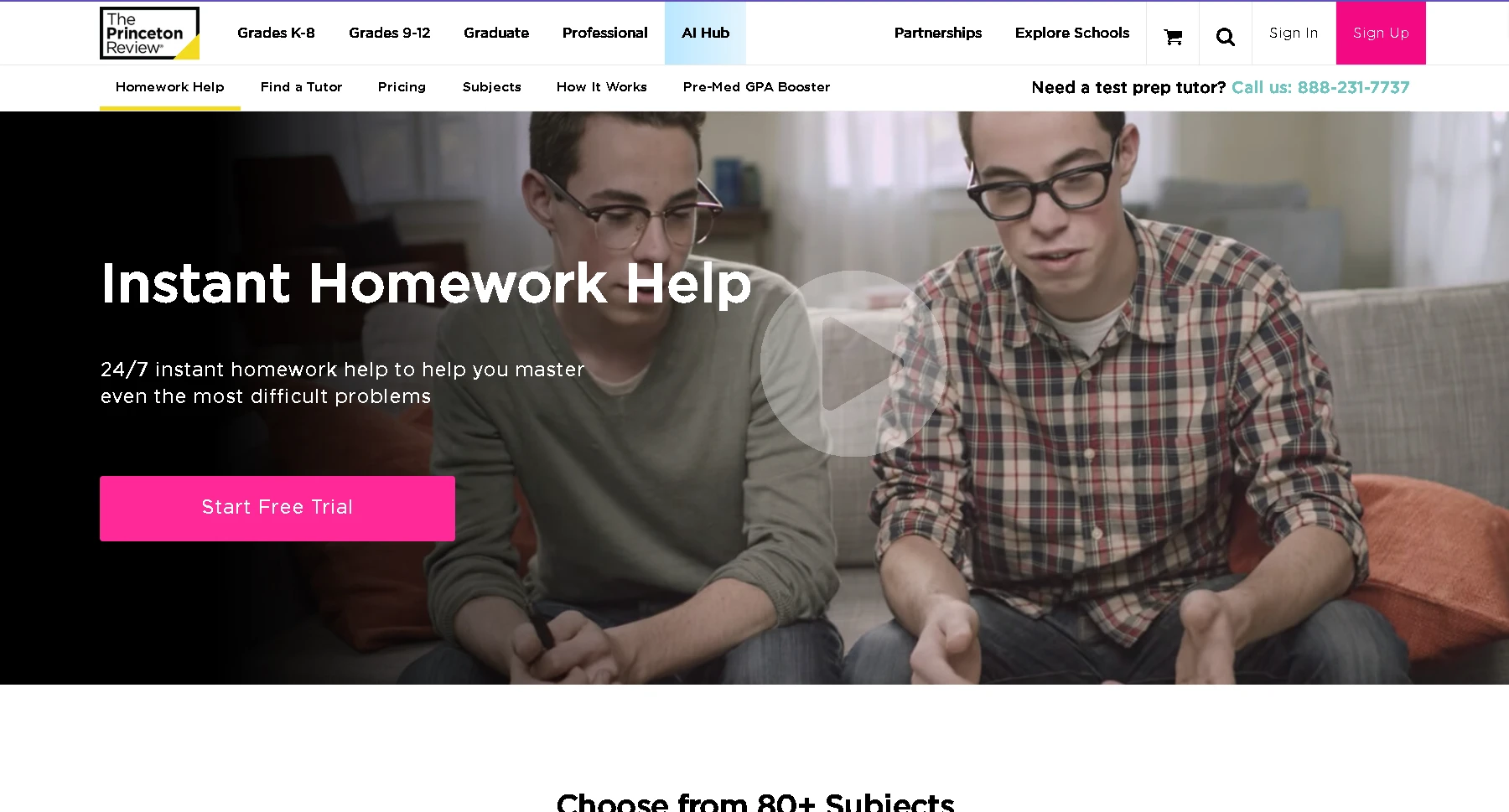
Admissions Counseling and College Services
Besides academics, TPR offers college and graduate school admissions counseling. This service includes help with college lists, essays, interviews, and application strategy. TPR’s counselors are former admissions officers or experienced educators. According to TPR, their admissions counseling is effective: in 2024, 80% of students who used TPR’s college admissions counseling gained admission to at least one of their top three choice schools. Many clients get into prestigious institutions (Harvard, MIT, etc.) thanks to this guidance. Similarly, their medical school counseling helped students get into top U.S. and international programs (Duke, Stanford, Cambridge, etc.). These statistics come from TPR’s reports, but they do indicate successful placement rates. In short, TPR’s counselors assist applicants with the holistic parts of college and graduate applications, complementing the test prep side.
Tutor Hiring and Onboarding Process
Hiring Criteria: TPR claims to hire only top tutors from leading universities. Candidates must have strong subject knowledge and communication skills. To apply, a tutor candidate first submits an online application and resume. Next, they must pass qualifying exams in each test type they want to teach. For example, an SAT tutor might take an SAT practice exam or subject test to prove expertise. Applicants can attempt each exam up to two times; they need to pass by the second try. Those who qualify move on to an interview and a live teaching demonstration (an “audition”). In this audition, they teach a mini-lesson to show their teaching style. After that, applicants undergo a background check, since they will be working with minors. Only after all this screening are they admitted to the training program.
Training and Certification: New tutors then go through a paid training regimen. This training lasts several weeks (2–5 weeks) and covers how to teach the exam content and use TPR’s materials. The training includes self-paced online modules and in-person or virtual classes with a trainer. For example, a new SAT tutor might review all SAT curricula and observe mock classes. After training, tutors must pass a final certification exam to be able to teach students. Throughout this process, tutors learn company policies on instruction and student interaction. TPR requires its tutors to be at least 18 and legally allowed to work in the U.S. or Canada. They must also commit to at least 5 hours per week. MCAT tutors are expected to have even higher credentials; often they have a college degree (bachelor’s or higher) and sometimes medical or graduate school experience. In short, TPR’s hiring is rigorous: strong academic background, subject tests, demo teaching, and extensive training are all required.
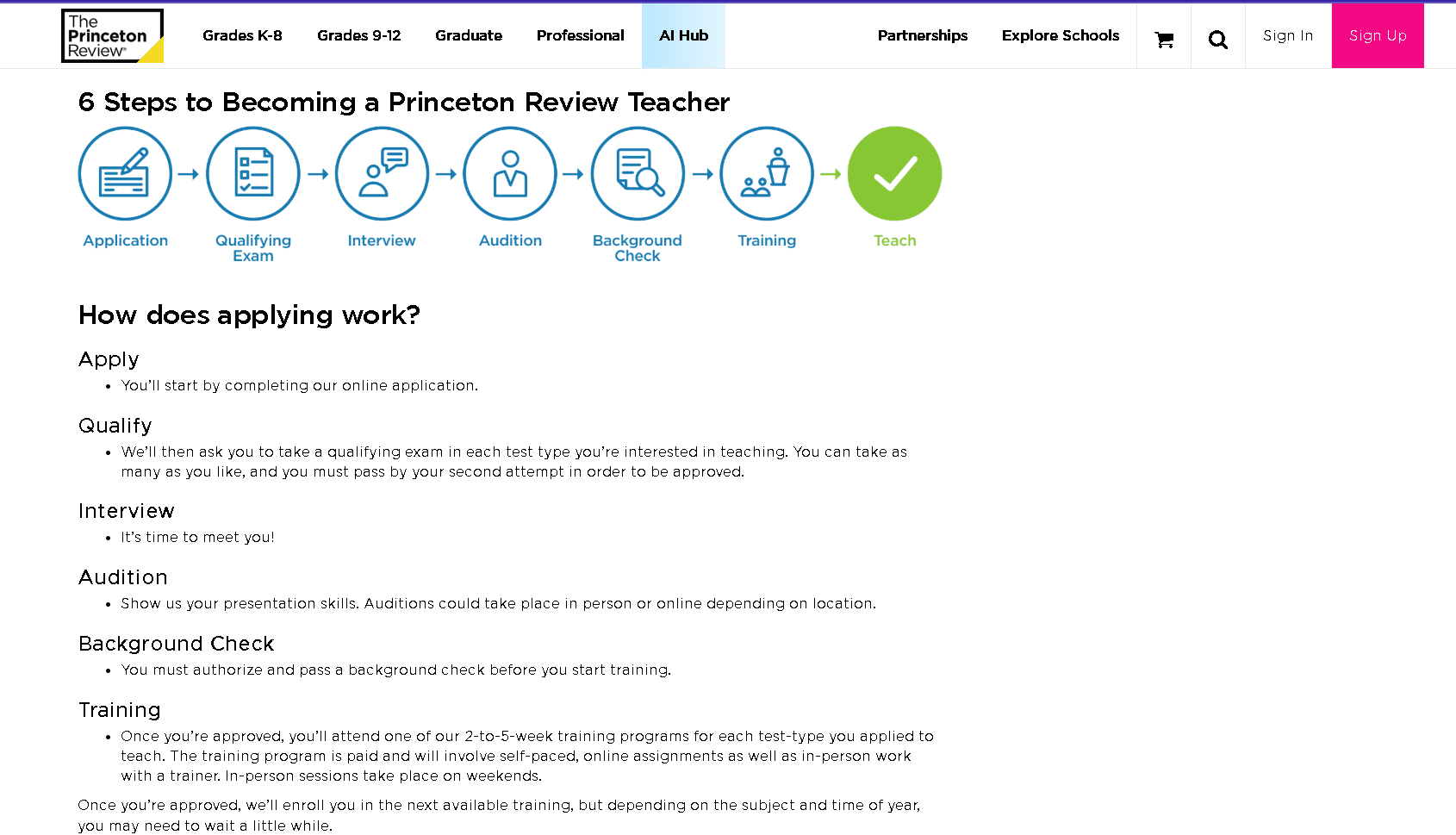
- Application and Exams: Online application, qualifying test(s) in chosen subject(s) (must pass within 2 tries).
- Interview & Audition: Interview with TPR staff; teach a sample lesson to demonstrate teaching skills.
- Background Check: Clean record required, as tutors work with students under 18.
- Training: Paid training course (2–5 weeks) per test/subject. Covers content and teaching methods.
- Commitment: Must be 18+, authorized to work, and available ≥5 hours/week.
- Preferred Credentials: Many tutors hold or are pursuing college degrees; MCAT instructors often have advanced degrees or pre-med background.
Instructor Qualifications and Backgrounds
TPR’s instructors come from diverse academic backgrounds, but they share key qualifications. Most have at least a bachelor’s degree, and many have graduate degrees or professional experience in their subject area. For example, a GRE or MCAT instructor might be a PhD student or an MD. TPR also emphasizes test mastery: tutors often have scored in the top percentiles on the exams they teach. In job listings, TPR typically requires teachers to have been “top scorers” and to be good at explaining concepts. During training, tutors learn specific strategies to help students. TPR says its instructors focus not only on content, but also on test-taking tactics and confidence building. In other words, TPR instructors aim to improve a student’s overall approach to the test, not just knowledge. The hiring process ensures that teachers know their subject deeply and can communicate it clearly.
Many TPR teachers are current or former teachers, tutors, or graduate students. Some are classroom teachers in core subjects; others are professionals working part-time (like engineers teaching math). TPR especially seeks “dynamic discussion leaders” for classroom courses. For in-person SAT classes, teachers often have education degrees or teaching experience. For online tutoring, the requirement is more flexible but still high. Overall, a tutor at TPR typically has strong credentials in their field and training on how to teach test content effectively. This combination of content expertise and pedagogical skill is a selling point for TPR.
Platform Usability & Technology
The Princeton Review provides a modern online platform for both test prep courses and tutoring. Students can access their course materials anytime on the web, including practice tests, video lessons, and drills. For live classes and tutoring, TPR uses an interactive online classroom. In this classroom, students can ask questions, participate in polls, use a whiteboard, and even collaborate with classmates in some formats. According to TPR, the online classroom is “fully interactive” and allows raising hands or chatting with peers. In addition, students have a personal dashboard that tracks their progress and scores.
The platform also includes analytics. After students take practice tests (like SAT or GRE practice exams), they get detailed score reports. Each report breaks down performance by section and question type. This helps students see where to focus their studies. The online account may show graphs of score trends over time. TPR’s mobile apps (for SAT, GRE vocab, etc.) let students study on the go. For example, an SAT app has lessons and practice drills in math and reading. These apps sync progress with the main platform. Overall, TPR’s tech aims to make prep flexible: a student can study in a browser or phone, at home or on the go, and see real-time feedback on their work.
Besides the student interface, TPR provides some analytics to parents or educators. For institutional partners, there are management dashboards that show how students are using the service and how their scores are improving. TPR highlights that teachers or administrators can log in to see overall data (like how many practice tests students have taken). The platform also offers live support: TPR advisors can schedule coaching calls, and there is a help center for technical issues. In short, TPR’s online system is meant to be comprehensive: it houses lessons, tests, tutor sessions, and progress tracking in one place. The technology may not be revolutionary, but it covers the expected features of modern online learning platforms.
Pricing and Packages
TPR’s pricing varies widely by product. Test prep courses range from a few hundred dollars to a few thousand, depending on format and subject. For example, as of 2024, a self-paced SAT course was $299 (for 1 year access) and a combined SAT+ACT course was $499. A more intensive live classroom or tutoring package costs more. Private tutoring is usually priced per hour: a targeted MCAT tutoring might start at $329 per hour, whereas a multi-hour bundle (like 30–50 hours) can total thousands (e.g. $8,800 for 50 hours). In K-12 subjects (like math or chemistry), tutoring rates tend to be in the $50–$100 per hour range. Admissions counseling (which is often sold in packages) can also run $1,000 and up, depending on how many sessions and services are included.
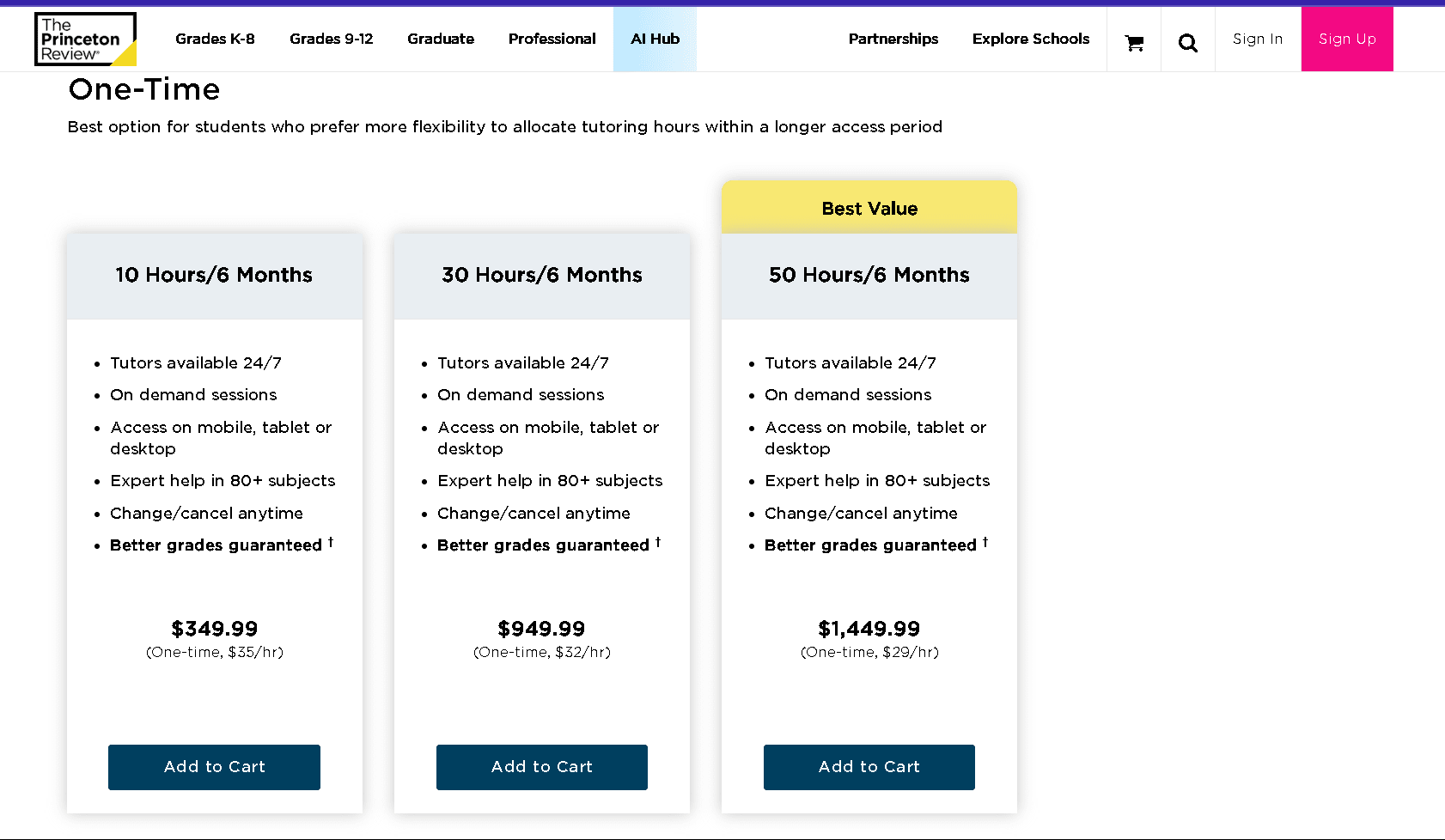
Course bundles often include study materials. For instance, a GRE course might include a set of prep books, access to online question banks, and a certain number of live classes. Discounts are sometimes available through promotions or for enrolling in multiple courses. One example: an SAT/ACT self-paced combo includes dozens of practice tests and video lessons for $499. The SAT 1500+ tutoring package (intended for students targeting top scores) can be expensive; Reddit users have mentioned rates like $353 per hour for 10-hour packages (discount applied) on that service. TPR also offers “Pay As You Go” tutoring where you only pay for the hours used, with no long-term contract. In comparison to competitors, TPR’s prices are on the higher end. For example, Kaplan’s similar SAT courses run $640–$1,300, Magoosh’s equivalent would be under $500, and Khan Academy is free. But TPR charges for the personal instruction and guarantees that other options often lack.
Customer Reviews and Complaints
Ratings: The Princeton Review generally has positive online ratings, but not perfect. On Trustpilot (a user review site), TPR has an excellent overall rating (4.3 out of 5 as of 2025). Thousands of students and parents have left reviews praising tutors and courses. The Better Business Bureau (BBB) gives TPR a high grade (A+), indicating few complaints relative to its size. These high marks suggest that many customers are satisfied with the service and its outcomes.
Positive Feedback: Satisfied students often praise the quality of instruction. For instance, many say a good tutor helped them understand hard topics or greatly improve a test score. College-bound families report that live SAT/ACT classes kept their teens motivated. Customers also appreciate the detailed practice tests and analytics – they feel the amount of prep material is very thorough. On the admissions side, some students credit TPR counseling with getting into dream colleges. These kinds of success stories align with TPR’s statistics (e.g. the 80% admission rate to top-choice schools). Furthermore, corporate and trade groups have recognized TPR’s programs: in 2024, TPR (through Tutor.com) won a Campus Technology “Product of the Year” award for its AI tutoring platform, and was a finalist for a Best of STEM tutoring award. These accolades add credibility and are often cited in marketing.
Negative Feedback: No company satisfies everyone. Some customer reviews note high prices and mixed results. A few students say the cost of tutoring or courses is steep, and complain if they did not reach their score goals. For example, online forums have instances of students feeling let down when a guaranteed score wasn’t met (though official refunds for not meeting guarantees are available, some say the terms were strict). There are also occasional complaints about sales tactics, like feeling pressured by upsells. On the academic content side, a few independent reviewers (and Reddit threads) have criticized TPR’s GRE/GMAT question banks as not matching the difficulty of the real exam, suggesting students should use other materials in addition. However, those accounts are anecdotal.
Legal and Regulatory Issues: TPR’s bigger challenges have come from advertising claims rather than classroom content. In 2024, the National Advertising Division (NAD, part of BBB’s National Programs) reviewed TPR’s MCAT advertising. They found that TPR’s claim “Score 515+ or gain 15 points, guaranteed” was too broad and not fully backed by data. The NAD recommended TPR stop using that claim on all marketing materials. TPR agreed to comply, so that specific promise is no longer advertised. This shows the company is monitored for truthfulness in its marketing promises. Another historic issue: in 2012, a US Department of Justice case alleged that TPR had defrauded a New York City public schools tutoring program by submitting false claims. TPR’s then-owner settled the suit, paying up to $10 million to resolve the allegations. Today’s Princeton Review is a different entity, but that past case is part of its history. In any case, TPR currently has an A+ BBB rating, meaning formal complaints have been relatively low. When customers do complain to BBB or other forums, TPR usually responds with refunds or resolutions for service issues.
Alternatives and Competitor Comparison
Many students consider other options besides The Princeton Review. Major competitors include Kaplan, Chegg, Magoosh, Khan Academy, and niche tutoring sites. Below is a comparison of key features among these services:
| Company | Pricing | Tutor/Instructor Quality | Coverage (Subjects/Tests) | Format |
|---|---|---|---|---|
| The Princeton Review | Wide range: e.g. SAT courses from ~$299, grad test courses ~$499–$1,699. Tutoring ~$50–$100+/hr (subject-level). Paid bundles (MCAT tutoring up to ~$8,800). | High standards: tutors are often top scorers or subject experts. Must pass qualifying exams and training. Many hold advanced degrees (e.g. MCAT instructors usually have college degrees). | Extensive: SAT, ACT, AP, PSAT, GRE, GMAT, LSAT, MCAT, LSAT, MCAT, USMLE, NCLEX, CFA, and many more test and subject areas. Also college admission consulting, homework help (K-college). | Several: Live online classes, in-person classes at centers (depending on location), self-paced online courses, private 1:1 tutoring (online), books and apps. |
| Kaplan | Test prep courses: SAT/ACT ~ $640 (with discounts, reg $799) for live courses. LSAT courses $900–$1,600; Bootcamps up to ~$4,000. Tutoring similar to TPR (often package deals). | Also high: Kaplan has experienced instructors (often former test scorers or educators). Known for thorough materials, though some reviews suggest TPR has more detailed answer explanations. | Similar to TPR: SAT, ACT, MCAT, GRE, GMAT, LSAT, AP, etc. Also wide K-12 and college test coverage. | Live online classes, on-demand video courses, in-person classes (in some areas), 1:1 tutoring. Offers special features like LSAT channel videos and adaptive quizzes. |
| My Engineering Buddy (MEB) | Pay-as-you-go pricing. Sessions typically charged by duration (e.g. hourly rates; no big monthly fee). | MEB hires “only the brightest tutors from top universities”. Tutors specialize in college-level STEM. (Less traditional test-prep focus, more homework help.) | Focus: science, technology, engineering, and math (STEM) subjects at college/master’s level. Over 100 subjects including advanced math, physics, CS, engineering specialties. | One-on-one online tutoring via a virtual whiteboard. Students interact live with tutors by chat, voice/video. Mainly live help sessions, no large classes or fixed courses. |
| Chegg | Subscription: Chegg Study Pack $19.95/month (includes step-by-step homework answers, expert Q&A). Textbook rental variable ($7+). Chegg also offers one-off tutoring sessions (~$30–$40/hr) in some cases. | Utilizes a network of “experts” who answer posted questions. Interaction is not live in most cases. Quality varies; some complain that answers lack full explanation or encourage cheating. | Mainly K-12 and college coursework (math, physics, chemistry, writing, etc.). Chegg does not focus on standardized test prep courses. It helps with homework and understanding concepts. | Primarily asynchronous Q&A platform and textbook solutions. Students post questions and pay for answers. Also has 1:1 live tutoring via video for some subjects. No structured courses or curriculum. |
| Magoosh | Low-cost test prep: e.g. 6-month GMAT plan ~$249, 12-month ~$349. GRE prep ~$130–$160. Score guarantee included (e.g. +70 points or refund for GMAT). Includes some free trial content. | All content (videos, questions) is created by in-house experts. No live instructors, but quality is high for a budget program. Many materials and practice questions; but no live teaching. | Test prep only: GRE, GMAT, LSAT, SAT, ACT, TOEFL, and others. No general tutoring or admissions services. | 100% self-paced: video lessons and online practice problems. Students study independently on the website/app. Some email/ask-a-tutor support available, but no live classes or tutoring. |
| Khan Academy | Free (501(c)(3) nonprofit). No cost for use. | High-quality content made by educational experts. Videos are clear and accessible. Content is peer-reviewed and aligned to standards. | Wide K-12 coverage: math (K–Calculus), science, history, SAT prep, AP subjects, and more. Official partner of College Board for SAT practice. | All self-study: Video lessons and interactive exercises on the website and apps. No live tutoring or courses, but lots of practice problems and hints. Very flexible and user-driven. |
Case Studies & Success Stories
The Princeton Review often shares success stories of students who used their programs. These can serve as informal case studies. For example, TPR reports that nearly all students improve in their surveys. According to a 2016 survey cited by TPR, 96% of students improved their grades after using TPR tutoring or courses. This indicates that almost everyone saw some benefit, although exact gains can vary. The company also highlights stories like a student raising an SAT score by hundreds of points after taking their course. Video testimonials (on platforms like YouTube) show students talking about going from a mediocre score to a top score after TPR classes.
Some media sources mention TPR-backed research. For example, TPR’s annual college survey (the “College Hopes & Worries Survey”) is often cited in education news. Their college and graduate school rankings (for best schools in various fields) are also covered by outlets like USA Today and college guides. In promotions, TPR may note students who got into Ivy League or highly selective schools after working with them. While these are not independent studies, they illustrate the intended success. TPR’s admissions counseling, for instance, claims 80% of students got into at least one of their top-3 schools. If true, that is a strong outcome. Students who share successes typically mention the combination of better test scores and improved essays/strategies that came from TPR coaching.
It’s important to take these stories with context. Many students who seek out test prep or tutoring are already motivated to improve. However, TPR’s own statistics show promising trends. For example, if 80% of their college applicants hit their dream schools, that suggests a positive impact. Another point: long-time customers like high school and college student Khan (not Khan Academy) posted on social media about reaching a 1470 SAT after TPR prep. While we can’t verify every anecdote, the volume of positive reviews and the awards suggest there are many success cases. Overall, the case studies provided by TPR are used in their marketing, but they do come with real student names and schools, and press references (like Entrepreneur naming top entrepreneurship schools with TPR research) support their credibility.
Who Should Choose The Princeton Review?
The Princeton Review may be ideal for certain types of students. It tends to suit learners who want structure, guidance, and a proven track record. For example:
- Aspiring high achievers. Students aiming for very high scores (e.g. 1500+ SAT, 165+ LSAT) may benefit from TPR’s specialized “higher score” courses. TPR has track records of helping motivated students reach competitive targets.
- Goal-oriented learners. Those who do best with deadlines and interaction may do well in TPR’s live classes or one-on-one tutoring. The guaranteed score increase can motivate disciplined study.
- Busy adults. Graduate students or professionals with complex schedules may like TPR’s flexibility. They can choose self-paced online or live evening/weekend courses for GRE, GMAT, etc.
- Students wanting prep consistency. Families that prefer a long-standing brand and detailed courses (often updated annually) may trust TPR more than a newer, cheaper option.
By contrast, The Princeton Review might be less suitable for:
- Tight budgets. TPR is relatively expensive. Students on a small budget may opt for cheaper courses (like Magoosh) or free resources (Khan Academy) to learn the basics.
- Self-paced independents. If someone is very self-motivated and just needs practice questions, a simpler solution might suffice. TPR’s live classes are best when a student needs external accountability.
- Very basic level learners. Students far below grade level might find TPR’s courses too fast-paced. TPR often assumes a certain baseline knowledge (especially in high school subjects).
- Shooters for quick fixes. If someone wants a huge score jump but won’t put in time to study, no course can help much. TPR’s guarantees require the student to do the work; they are not easy get-rich-quick schemes.
In summary, a student who plans to invest time and money for big improvements, and who values live instruction and a money-back guarantee, is a good fit for The Princeton Review. Someone who mainly needs a library of practice questions might prefer a lower-cost or free resource.
Awards and Media Recognition
The Princeton Review and its affiliates have received several industry awards and media mentions in recent years. For example, in 2024 TPR’s tutoring arm was named a finalist for the “Educators Pick Best of STEM” awards, recognizing their high-dosage tutoring program. In the same year, Tutor.com (a sister company of TPR) won Product of the Year awards from Campus Technology and THE Journal for its AI-driven tutoring tool and learning platform. Tutor.com was also recognized by the Software & Information Industry Association (SIIA) for having an excellent online student experience. These honors reflect innovation in educational technology.
TPR itself is often in the news for its research. The company regularly releases school rankings and surveys (such as best colleges, business schools, law schools, and student opinion polls) which are covered by media outlets. For instance, their “Best Business School Rankings 2024” and the “College Hopes & Worries Survey” have been cited in news articles. These features contribute to TPR’s media presence and reputation. Additionally, leadership changes (like new CEOs or product officers) have been covered. Overall, while most awards recently have been in the context of Tutor.com’s tech tools, TPR’s decades of service in education and its research publications keep it visible in the media.
Summary of Offerings
Free Resources: The Princeton Review offers some free test prep content as well. For example, they have free practice tests and sample lessons on their website. They also run occasional free events or webinars for SAT/ACT prep.
Books and Materials: TPR publishes over 150 books (through Penguin Random House) on test prep and college planning. These include classic titles like “The Best 390 Colleges” and test prep guides for the SAT, ACT, GRE, etc. Many of these books are updated annually. Buying these books gives another way to access TPR’s content without enrolling in classes.
Guarantee: Most paid courses come with a “Better Score Guarantee.” This typically means TPR expects most students to improve, and if the promised score (based on the course name) is not reached, the student can either get a full refund or repeat the course for free. The exact terms vary by course. The refund guarantee is strong on modern GRE and GMAT courses. However, as noted, bold claims like “+15 MCAT points guaranteed” have been scrutinized and scaled back.
Legacy and Parent Company: The Princeton Review brand has been owned by several companies. In 2017, it was acquired by South Korea’s ST Unitas, and in 2022 it became part of Primavera Capital (which also owns Tutor.com). Despite these ownership changes, TPR continues to operate under its own name in the U.S.
Final Verdict: The Princeton Review is a major, full-service education provider. Its strength lies in the breadth of offerings and the experience it brings. For students with the budget and drive to seek structured, high-quality prep, TPR is a solid choice. The company’s long history and high ratings suggest reliability. However, students should research how the price fits their needs and consider combining TPR prep with independent study. Those on a tight budget or who prefer self-study may look at Chegg, Magoosh, or Khan Academy. As always, the best choice depends on a student’s learning style and goals. In any case, TPR remains one of the most comprehensive and trusted names in test prep and tutoring.
Sources: The above information is compiled from The Princeton Review official materials and course pages, media reports and press releases about TPR, independent review sites (e.g. TestPrepInsight, Sojourningscholar), Trustpilot and BBB profiles, Reddit/Quora discussions, and news coverage. Key references include The Princeton Review’s own press releases
******************************
This article provides general educational guidance only. It is NOT official exam policy, professional academic advice, or guaranteed results. Always verify information with your school, official exam boards (College Board, Cambridge, IB), or qualified professionals before making decisions. Read Full Policies & Disclaimer , Contact Us To Report An Error

